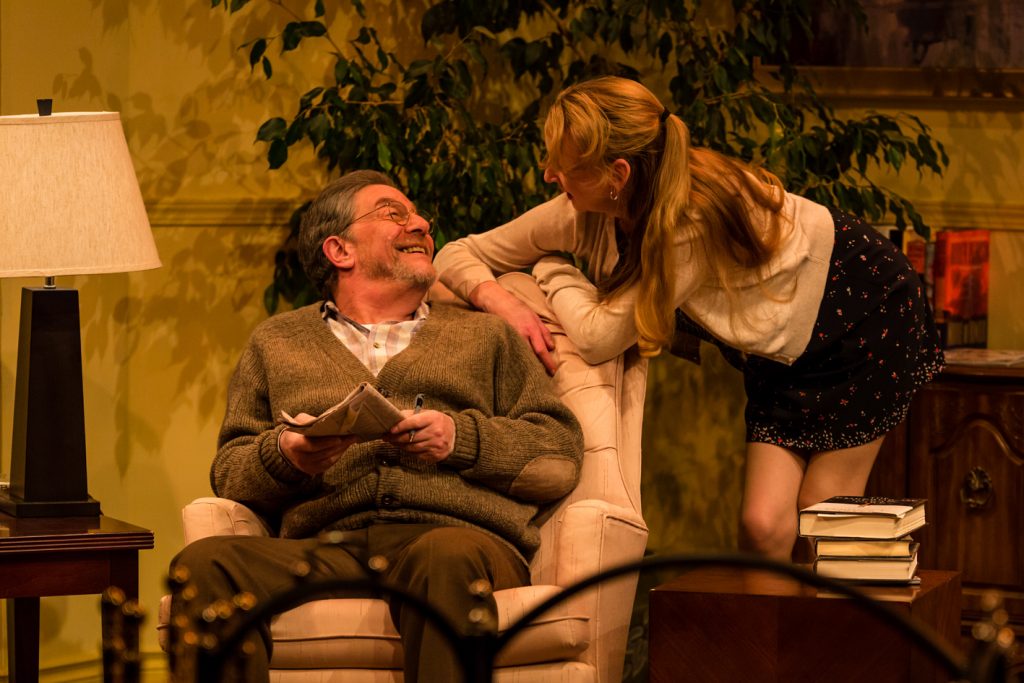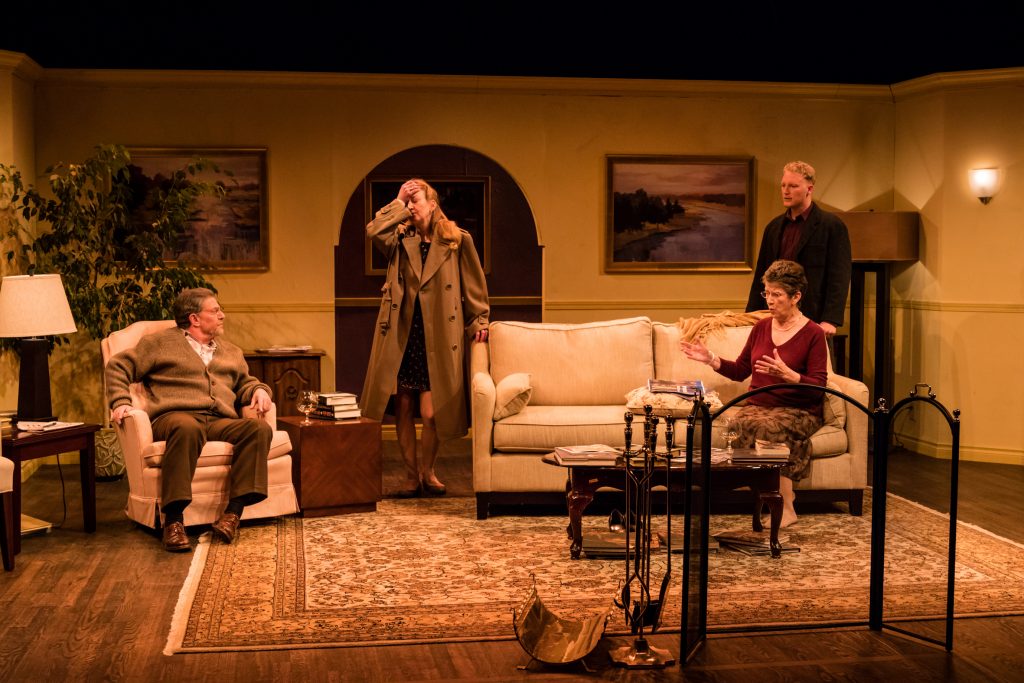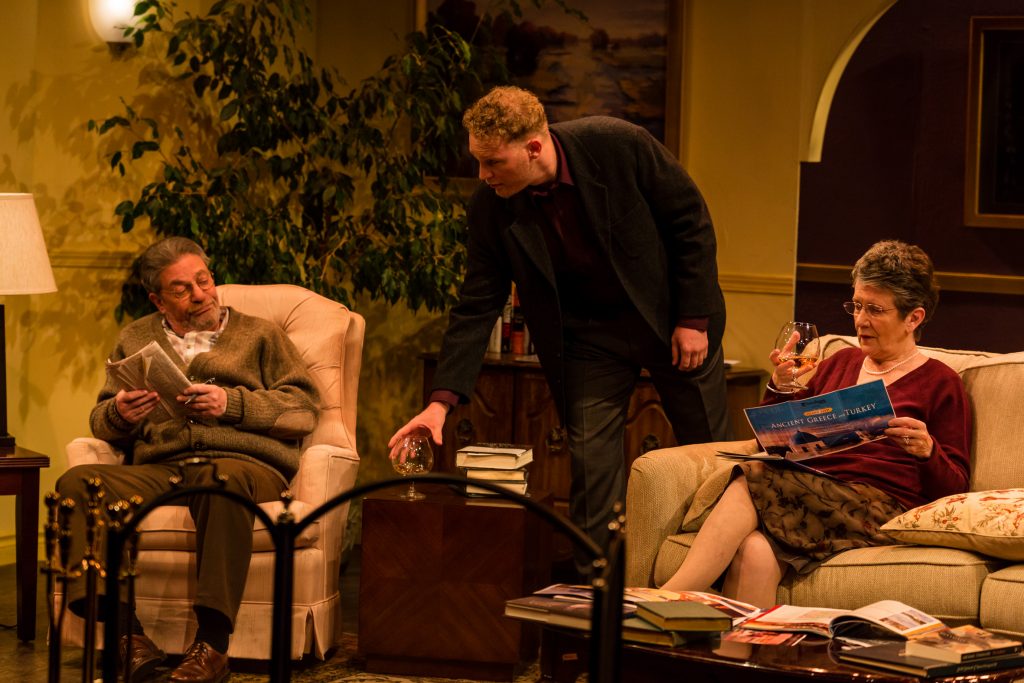
Credit: Javier Sotres
At PAL Studio Theatre until October 29, 2017
604-363-5734/brownpapertickets.ca
Posted October 12, 2017
Homeward Bound, set in late October after a family dinner, will make you grateful for your own relatives no matter how eccentric or disagreeable they are. Written by the late Canadian playwright Elliott Hayes, the play – like a Thanksgiving turkey – is comprised of light and dark meat; by the time the pumpkin pie arrives, all that’s left of the turkey is a carcass, stripped bare with only bits of flesh clinging to the wreckage. Metaphorically, Homeward Bound ends the same way.
The play is vaguely reminiscent of Who’s Afraid of Virginia Woolf? but is not as menacing. Hayes has been compared to both Neil Simon and Howard Pinter but he’s not as flippantly funny as Simon or as profound as Pinter.
Homeward Bound, however, has its moments.

Set design: Glenn MacDonald
Credit: Javier Sotres
Glenn MacDonald’s tasteful living room set (with its patterned carpet, oatmeal-coloured upholstered settee and bland but pretty landscapes on the walls) sets the stage for a middleclass Ontario family that has come together in the family home for a champagne celebration.
Retired couple Bonnie Beachum (Anna Hagan) and her husband Glen (Howard Siegel) have a surprise to share with their adult children Norris (Mia Ingimundson) and Nick (Jordon Navratil). Norris is a wreck, a bundle of nerves who can’t stop picking arguments with her brother. Sibling rivalry, acceptable – sort of – in childhood, has reached ugly, epic proportions and the sniping is non-stop. She accuses him on not liking her twin boys (bedded down somewhere in the house and awaiting a bedtime story); he responds by saying he hates kids. Meanwhile, Norris’s husband Kevin (Chris Walters) has gone off in a huff into the cold night. And Nick’s gay partner Guy (Seth Little) has not turned up for dinner. Nick says Guy is “working late.”
While we have a grudging admiration for Bonnie, we really don’t like anyone else. “You’re all horrible”, whines Norris, and we have to agree. And all the bickering reminds us of some of our own disastrous family gatherings.

Credit: Javier Sotres
Curiosity about how it will all end drives Homeward Bound home. Before the champagne is popped and Bonnie reveals the big secret she and Glen have been keeping all evening, a whole load of other cats are let out of a whole load of other bags: infidelity, homosexuality, alcoholism, pregnancy, divorce and death.
Much is made of a skunk in the garage at which point Homeward Bound dips perilously close to farce with everyone arguing over who’s going to go out to make sure the car windows are closed. And since Kevin left wearing Nick’s coat, Nick complains about his missing coat. He can’t go to the garage – it’s October and it’s Ontario – because it’s too cold. In the end I think, because they can’t agree, they all scramble to get to the garage.
But Hayes had his finger firmly on the middle class pulse when he wrote Homeward Bound. Glen quips, “Scandal has been elevated to the level of routine”. What was unspoken not so long ago is now spoken of openly. For the older generation, change is happening faster than it can keep up. “Amorality is the new morality”, Glen says. In the words of Cole Porter, “Anything goes.” Or, as we said in the 60s, you have to be prepared to “go with the flow.”
Produced by Western Gold Theatre under the direction of William B. Davis, these are solid performances but there’s little to like in these characters: Norris, Nick and Kevin are children masquerading as adults; batty Glen hides evasively behind his crossword puzzle; and Guy, seemingly sweet, is not what he seems. The glue in this dysfunctional family is Bonnie and Hagan makes her a straight-shooting and seemingly impenetrable matron. Until the end. Hagan’s long monologue brings it all home: we can prepare for and accept almost anything that life throws in our path. But the ultimate challenge is death and no matter how well-prepared you think you are for the death of those you love, you’re not.

